|
|
|
Sort Order |
|
|
|
Items / Page
|
|
|
|
|
|
|
| Srl | Item |
| 1 |
ID:
175154


|
|
|
|
|
| Summary/Abstract |
Some scholars in International Relations and comparative politics continue to debate how to obtain the strongest explanatory theory whereas others hold that each approach should be treated as its own area of research. Both of these groups tend to agree that factors from across paradigms cannot be coherently combined with each other. On the contrary, Sil and Katzenstein have argued for analytic eclecticism in scholarship, which would not treat research traditions or paradigms as strict limitations on theory construction. Inspired by pragmatism, they have made a compelling case that considerations of usefulness and knowledge cumulation are more important than paradigmatic fidelity. This forum examines analytic eclecticism from the points of view of neo-empiricism, feminism, and interpretive constructivism, followed by a reply by Sil. A decade has passed since the publication of Sil and Katzenstein’s Beyond Paradigms, so it seems appropriate to reflect upon the strengths and weaknesses of analytic eclecticism.
|
|
|
|
|
|
|
|
|
|
|
|
|
|
|
|
| 2 |
ID:
175158
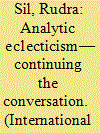

|
|
|
|
|
| Summary/Abstract |
In this response to the contributions in this symposium, I approach the above articles not as wholesale critiques requiring point-by-point rebuttal but as constructive engagements that require clarification or invite further reflection as part of an ongoing conversation. In some instances, I revisit and elaborate upon the main motivations and assumptions that Peter Katzenstein and I had in mind as we sought to lay out the significance of analytic eclecticism for different audiences. At other times, I take it upon myself to consider aspects of our approach that might be updated or reframed in light of concerns raised by some of the authors. I specifically address four issues that have been raised: the core logic of analytic eclecticism and its operationalization with respect to once-dominant paradigms in International Relations; the link between complexity, causality, and constitutive logics; the status of metatheory and the links between eclecticism and pragmatism; and the relationship between scholarly debates and “real-world” issues of policy and ethics. Whether the response is satisfactory or not, it is worth bearing in mind that, for Peter Katzenstein and myself, analytic eclecticism was always meant to be more of an ethos than a method or manifesto; that ethos long predates our published work and is evident in the thoughtful contributions that constitute this symposium.
|
|
|
|
|
|
|
|
|
|
|
|
|
|
|
|
| 3 |
ID:
126511
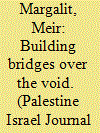

|
|
|
|
|
| Publication |
2012.
|
| Summary/Abstract |
After more than 45 years of occupation, the impact of nonviolent movements on Israeli society is still difficult to assess, and therefore their effectiveness is difficult to evaluate. The failure of all efforts aimed at ending the occupation is now clearer than ever, although, and this is remarkable, the fight against the system supporting this status quo has never declined. Despite this tireless activism, it remains unclear whether these nonviolent efforts have meaningfully contributed to peace or whether they have proved largely irrelevant to domestic and regional policies.
Not only do we lack convincing answers, but the answers we do have also differ depending on external circumstances. In bleak times, as during the Second Lebanon War, Operation Cast Lead and both intifadas, activist movements often feel useless. In contrast, during more encouraging times, such as the immediate aftermath of U.S. President Barack Obama's election, the feelings tend to be more positive and optimistic. This may be a defining issue among dissidents in Israel: shifting views without knowing what tomorrow has in store for them, going against the current within an uncertain environment.
|
|
|
|
|
|
|
|
|
|
|
|
|
|
|
|
| 4 |
ID:
093960
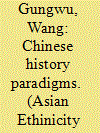

|
|
|
|
|
| Publication |
2009.
|
| Summary/Abstract |
Chinese people have had a strong bond with a long continuous history that has shaped their identity as Chinese. The opening to the outside world during the last century has exposed them to different kinds of histories. Within China, the threats to their civilisation and the possibility of national history have led to many revisions of the Chinese past. Those who have lived outside China have faced alternative historical representations. How will the various experiences with history paradigms influence the very idea of being Chinese?
|
|
|
|
|
|
|
|
|
|
|
|
|
|
|
|
| 5 |
ID:
088304
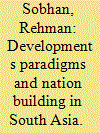

|
|
|
|
|
| Publication |
2009.
|
| Summary/Abstract |
Prof Rehman Sobhan, chairperson centre for policy dialogue(CPD), Bangladesh, argues that the dominant development paradigms prevent in South Asia have contributed to the establishment of an elite which is more integrated with the globalisation process.
|
|
|
|
|
|
|
|
|
|
|
|
|
|
|
|
| 6 |
ID:
110848
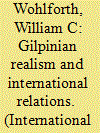

|
|
|
|
|
| Publication |
2011.
|
| Summary/Abstract |
I argue that realism in particular and IR more generally erred by assigning Kenneth Waltz's Theory of International Relations pride of place in revivifying realist thought. Had Robert Gilpin's War and Change in World Politics been given equal billing, international relations research would have unfolded quite differently over the past three decades. Scholars would not have been bewildered by change, bewitched by the balance of power, blind to numerous potentially powerful realist theories, and bothered by endless and unproductive zero-sum debates among representatives of competing paradigms. And had all those pathologies been absent, we would be far better prepared today for the intellectual and policy challenges of a world in which underlying power balances appear to be changing quickly, and the status quo inter-state order is ever more contested.
|
|
|
|
|
|
|
|
|
|
|
|
|
|
|
|
| 7 |
ID:
187146
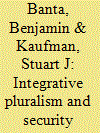

|
|
|
|
|
| Summary/Abstract |
The idea of integrative pluralism offers a promising path for the development of theory in international security and international relations. Instead of either trying to shoehorn all theorising into a single, limited paradigm or giving up entirely on theoretical progress, the integrative pluralist approach calls for bringing diverse approaches together. More precisely, integrative pluralism involves explaining specific phenomena by linking causal processes across multiple layers of reality, and then using the findings to inform broader theoretical constructs such as IR theory paradigms. Elements of the integrative pluralism approach are already visible in the work of mainstream scholars such as Snyder and Katzenstein, as well as of critical scholars such as Sjoberg and Hansen, but the field has tended to overlook these scholars’ efforts at theoretical integration. To more explicitly develop integrative pluralism for our field, this article first draws on critical realist philosophy and social theory. It then illustrates how further steps in this direction might be taken, in particular by highlighting the integrative pluralist aspects of Kaufman's applications of symbolic politics theory to explaining ethnic conflict and war more generally.
|
|
|
|
|
|
|
|
|
|
|
|
|
|
|
|
| 8 |
ID:
118166
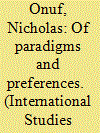

|
|
|
| 9 |
ID:
130925
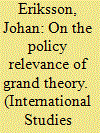

|
|
|
|
|
| Publication |
2014.
|
| Summary/Abstract |
This paper challenges the commonly held perception that grand theory is irrelevant for policy. Policy, it is often argued, is in need of detailed case-oriented empirical analysis and instrumental policy recommendations rather than any sweeping generalizations or lofty ideas emanating from grand theory. Notwithstanding, this paper argues that grand theory has an underestimated relevance for policy. To be able to see and appreciate this, the notion of policy relevance must be expanded. Whereas grand theory and grand concepts such as Realism, Liberalism, Constructivism, or Marxism do not provide case-specific knowledge or recommendations, they provide general roadmaps, conceptualization of world affairs, and also have a symbolic function, legitimating or challenging established policy paradigms. Policymakers, akin to grand theorists, arguably like to make sweeping statements and generalizations. Drawing on theory and findings in public policy studies, here applied to international relations and foreign policy, this paper suggests conditions under which grand theory can be relevant for policy.
|
|
|
|
|
|
|
|
|
|
|
|
|
|
|
|
| 10 |
ID:
097058
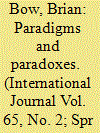

|
|
|
| 11 |
ID:
175155
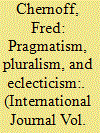

|
|
|
|
|
| Summary/Abstract |
This paper seeks to show ways in which analytic eclecticism can be strengthened to encourage hybrid theorizing capable of yielding more practically useful principles for foreign policy decision-makers. The paper also seeks to show that some of the advantages of analytic eclecticism are overstated, notably the ability to sidestep difficult questions in the philosophy of social science. Nevertheless, with a proper deepening of their discussion of pragmatism, the core of the practical consequences of analytic eclecticism can be advanced with greater force and with a strengthened methodological rationale.
|
|
|
|
|
|
|
|
|
|
|
|
|
|
|
|
| 12 |
ID:
086728
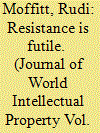

|
|
|
|
|
| Publication |
2009.
|
| Summary/Abstract |
The idea of resistance generally has normative associations, particularly in the current intellectual property (IP) environment. Justifications for actions are framed as supporting an aggrieved party in an unequal struggle against a clearly superior opposition. The adoption of the mantle of resistance is not limited to one side. Just as organizations such as Electronic Freedom Foundation claim they are part of the resistance to global corporate domination of culture, musicians, music owners and their associations portray themselves as mounting a resistance against a veritable tsunami of technology-driven piracy that threatens to destroy the production of culture and the livelihood of artists. This article starts from this point in order to question the assumptions we have about resistance. Using a paradigmatic framework, it will recast resistance as points in a historic process that are normatively neutral yet ontologically and practically potent. Application of this framework to the history of Anglo-American copyright reveals two types of resistance that bracket a major shift in the conceptualization and practice of the paradigm. In the end, this perspective demythologizes resistance. Resistance, in this perspective, is not emancipatory or heroic; it is another tool that can be useful in particular moments in the complex struggles over the defining of our social existence.
|
|
|
|
|
|
|
|
|
|
|
|
|
|
|
|
| 13 |
ID:
157105
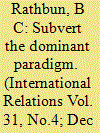

|
|
|
|
|
| Summary/Abstract |
It is frequently maintained that rationalism is something other than an ‘ism’ of International Relations. Inspired by critical theory but using quantitative survey data, this article takes issue with that notion, arguing that rationalist work – with its emphasis on interests, institutions, and information – has a distinct logic of individualistic utilitarianism. It therefore exhibits all of the subjective biases of other ‘isms’, defining both the answers and the very questions that are asked. Using data from the 2011 TRIP survey, I show that those substantive commitments reveal themselves in the economic ideology of those who make rationalist assumptions in their work. Parallel to a view of international relations in which egoistic units seek material gains, rationalists identify as economic libertarians at a much higher rate than non-rationalists. All of this suggests that rationalists have an unacknowledged and unconscious bias in their scholarship that threatens the positivistic epistemology to which most claim to be committed.
|
|
|
|
|
|
|
|
|
|
|
|
|
|
|
|
| 14 |
ID:
134171
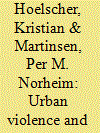

|
|
|
|
|
| Publication |
2014.
|
| Summary/Abstract |
Despite problems of violence domestically, Brazil has played a key leadership role as part of MINUSTAH peacekeeping operations in Haiti since 2004. This article addresses how Brazil's international military engagement is shaping domestic approaches to urban security, and what may be the implications of the use of military strategies, operations, and norms to address issues of public security in Brazilian cities. It is argued that current approaches toward urban security employing military-trained peacekeepers actually represent a continuation of old paradigms, yet these recent militarised approaches are likely evolving into newer and potentially more accountable forms by constraining indiscriminate use of force and establishing a positive state presence in marginal urban areas. As such, the article connects long-established issues of dealing with urban violence in Latin America with ongoing debates in the United States and beyond about post-counterinsurgency approaches to increasingly urban conflict settings. It reflects on potential lessons to be learned from the Latin American perspective, while showing also how these have changed over the last decade. The article concludes that despite the potential utility of force in some urban conflict settings, this approach could entail a normative shift towards legitimising forceful containment of violence, and hinder democratic consolidation in Brazil.
|
|
|
|
|
|
|
|
|
|
|
|
|
|
|
|
|
|
|
|
|